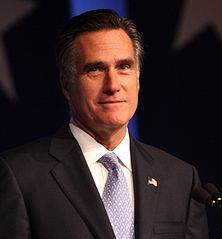Mitt Romney Vs. The Environmental Community

I stand with Daniel Kessler, spokesperson for climate campaign 350.org, who said, “It was ironic that Romney wants to help Americans, but not the planet Americans inhabit.” Exactly right, Daniel. Though, not to quibble about a word, but I’m not sure “ironic” is perfect there. How about “self-contradictory?” Americans aren’t helped by clean air?
My real concern is not Romney would say something like this; the pandering of politicians knows no bounds, and in this regard, Romney is the poster-child. I’m more worried about what this implies: his advisors have determined that a majority of undecided voters are so uninformed, so credulous, and so completely lacking in the most basic reasoning skills that they’ll be unable to see how nonsensical this is. That’s not good.

I suppose this bolsters the case made by those who pessimistically state that we won’t do anything substantive until we have a substantively obvious problem.
The people reading this blog are amply aware that the USA doing anything right up to and including perfection won’t change planetary outcomes. As best as I have been able to infer, we advocate our positions herein based on two primary reasonings. The first is that you have to do something in order to have an outcome other than doing nothing. The second one is the one I wonder about. Will the world rally around because it sees the USA take a strong position? One would hope, because that is essential to a positive outcome.
If that is the case, getting our political process focused on this might be the highest priority we have.
“I suppose this bolsters the case made by those who pessimistically state that we won’t do anything substantive until we have a substantively obvious problem.”
What reason is there to suppose that action will be taken when the problems become obvious? It is quite likely that instead of taking action, we will be told that the problems are not of our making, but rather, natural cycles over which we have no control.
Scary! either way
If Mitt is right then the education system seems to be lacking
If he’s wrong, how do people like him get to these levels of power in a democratic society